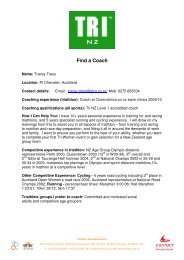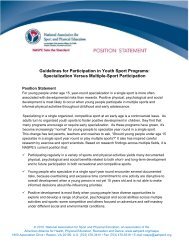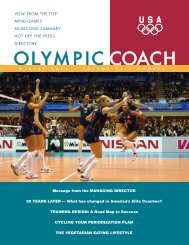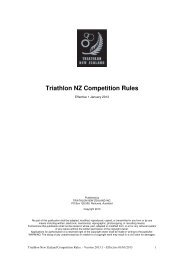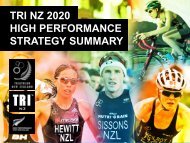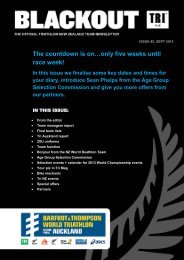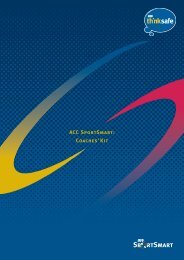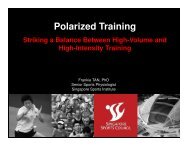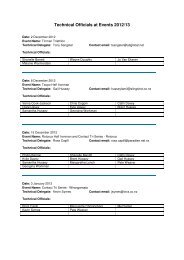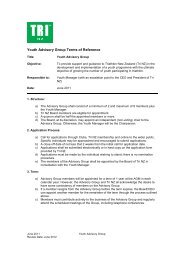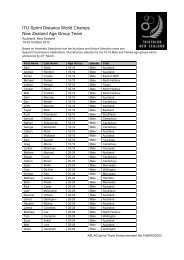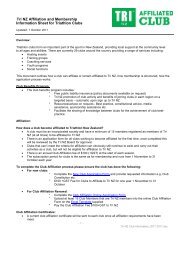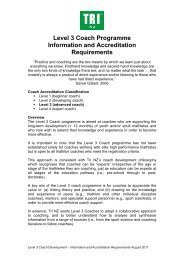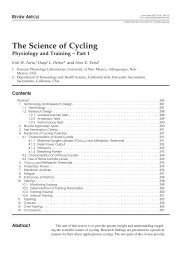Coach Tracking Study(PDF) - sports coach UK
Coach Tracking Study(PDF) - sports coach UK
Coach Tracking Study(PDF) - sports coach UK
Create successful ePaper yourself
Turn your PDF publications into a flip-book with our unique Google optimized e-Paper software.
COACH TRACKING STUDY<br />
Table 3: The percentage of <strong>coach</strong>es who believed an information<br />
source was important, and the change from Year Two<br />
Year Four<br />
(%)<br />
Year Two<br />
(%)<br />
Difference<br />
Planning programmes (over a season, year, cycle) 88.7 97.6 -8.9<br />
Organisation of sessions (eg facilities, equipment, health<br />
and safety)<br />
89.9 97.4 -7.5<br />
Decision making 92.2 98.9 -6.7<br />
Facilitating 92.1 98.2 -6.1<br />
Planning sessions: structure, format, content 93.6 98.9 -5.3<br />
Providing instruction 94.7 100 -5.3<br />
Managing the <strong>coach</strong>ing environment 91.5 96.7 -5.2<br />
Self-reflection and critical thinking 95.4 99.6 -4.2<br />
Technical/tactical knowledge 95.4 99.4 -4<br />
Questioning 95.5 99.2 -3.7<br />
Knowledge of a wide range of <strong>coach</strong>ing methods 95 97.9 -2.9<br />
Evaluating sessions/programmes 96.2 99.1 -2.9<br />
Understanding/evaluating athlete/player development 95.9 98.7 -2.8<br />
Observation and analysis 97.3 100 -2.7<br />
Responsiveness/adaptability to situation/person 97.4 99.5 -2.1<br />
Listening 98.2 100 -1.8<br />
Providing feedback 98.2 100 -1.8<br />
Motivating athletes 97.6 98.5 -0.9<br />
All the evidence points to an understandable trend in the<br />
knowledge sought by <strong>coach</strong>es. Initially, the basic skills<br />
needed to run a <strong>coach</strong>ing session were most important,<br />
but as <strong>coach</strong>es gain more experience, so they want to<br />
improve their <strong>coach</strong>ing by adding different skills and start<br />
to reflect on their own practice (a process that in itself<br />
requires new knowledge). Of course, this doesn’t mean<br />
that <strong>coach</strong>es are no longer looking for tactical and<br />
technical knowledge – these are still the most commonly<br />
sought types – rather, it shows <strong>coach</strong>es are interested in<br />
increasing their breadth of knowledge.<br />
<strong>Coach</strong>es have also become more discerning about the<br />
quality of knowledge being offered. Common reactions<br />
from <strong>coach</strong>es about the best learning sources in the<br />
previous year demonstrate how they value new<br />
information to develop their sessions. Comments<br />
suggested that new information gives me different aspects<br />
and new ideas or helped by revitalising session by introducing<br />
new ideas.<br />
However, there is also a danger of <strong>coach</strong>es feeling they are<br />
learning nothing new and therefore the value of the<br />
learning source is reduced. As one <strong>coach</strong> commented:<br />
It was interesting but of little real use as it didn’t introduce<br />
much that was new to me beyond some tactical analyses.<br />
Otherwise, it was frustrating.<br />
9


